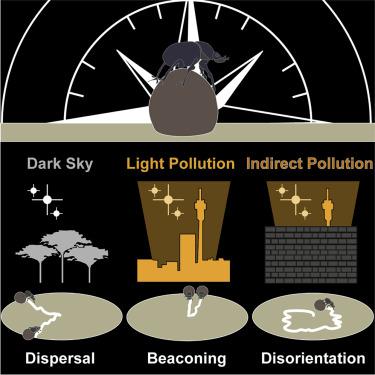Current Biology ( IF 9.2 ) Pub Date : 2021-07-29 , DOI: 10.1016/j.cub.2021.06.038 James J Foster 1 , Claudia Tocco 2 , Jochen Smolka 3 , Lana Khaldy 3 , Emily Baird 4 , Marcus J Byrne 5 , Dan-Eric Nilsson 3 , Marie Dacke 3

|
Increasing global light pollution1,2 threatens the night-time darkness to which most animals are adapted. Light pollution can have detrimental effects on behavior,3, 4, 5 including by disrupting the journeys of migratory birds,5,6 sand hoppers,7, 8, 9 and moths.10 This is particularly concerning, since many night-active species rely on compass information in the sky, including the moon,11,12 the skylight polarization pattern,13,14 and the stars,15 to hold their course. Even animals not directly exposed to streetlights and illuminated buildings may still experience indirect light pollution in the form of skyglow,3,4 which can extend far beyond urban areas.1,2 While some recent research used simulated light pollution to estimate how skyglow may affect orientation behavior,7, 8, 9 the consequences of authentic light pollution for celestial orientation have so far been neglected. Here, we present the results of behavioral experiments at light-polluted and dark-sky sites paired with photographic measurements of each environment. We find that light pollution obscures natural celestial cues and induces dramatic changes in dung beetle orientation behavior, forcing them to rely on bright earthbound beacons in place of their celestial compass. This change in behavior results in attraction toward artificial lights, thereby increasing inter-individual competition and reducing dispersal efficiency. For the many other species of insect, bird, and mammal that rely on the night sky for orientation and migration, these effects could dramatically hinder their vital night-time journeys.
中文翻译:

光污染迫使蜣螂定向行为发生变化
日益增加的全球光污染1 、2威胁着大多数动物适应的夜间黑暗。光污染会对行为产生不利影响,3、4、5 包括扰乱候鸟、5、6沙漏斗、 7、8、9 和飞蛾的旅行。10这尤其令人担忧,因为许多夜间活动物种依赖于天空中的指南针信息,包括月亮、11、12天光偏振模式、13、14和星星,15坚持自己的路线。即使是没有直接暴露在路灯和照明建筑物中的动物,也可能会受到天辉3 、4形式的间接光污染,这些光污染可以远远超出城市区域。1 , 2虽然最近的一些研究使用模拟光污染来估计天辉如何影响定向行为,7、8、9 迄今为止,真正的光污染对天体定向的影响一直被忽视。在这里,我们展示了在光污染和黑暗天空地点的行为实验结果,并与每种环境的摄影测量相结合。我们发现光污染掩盖了自然的天体线索,并导致蜣螂定向行为发生巨大变化,迫使它们依靠明亮的地球信标代替天体指南针。这种行为变化导致对人造光的吸引力,从而增加了个体间的竞争并降低了分散效率。对于依赖夜空进行定位和迁徙的许多其他昆虫、鸟类和哺乳动物,



























 京公网安备 11010802027423号
京公网安备 11010802027423号